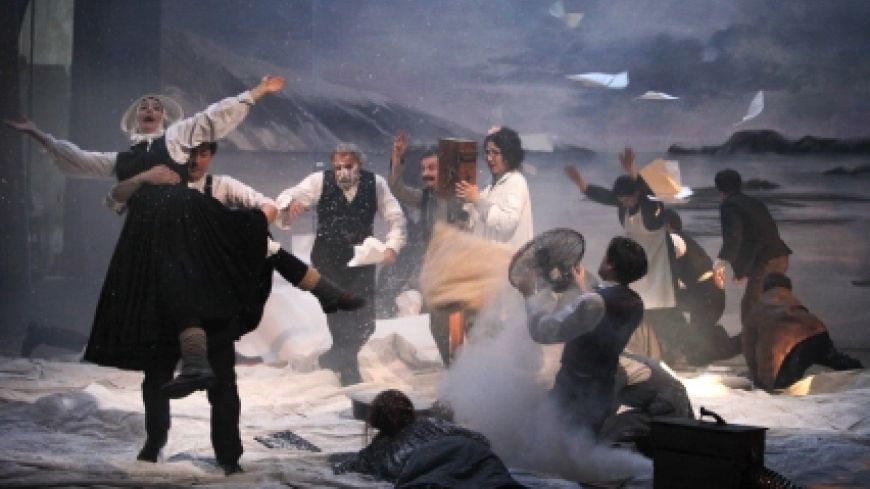
This is a theatrical journey. It will take us from the dawn of a new era, through turbulent times and seas, into realms of silent film and imagination and on to the very ends of the earth.
It begins with a bus trip to the Lowland Hall at the Royal Highland Centre. While this may sound prosaic, it’s very much in the spirit of travelling to the Cartoucherie, the former munitions factory home of Théâtre du Soliel in eastern Paris. The Festival’s ambitious excursion to this temporary space at Ingliston is justified in enabling this extravagant production alone.
The voyage continues as audience members make their way into a central courtyard-like space, from which draped “fairground” entrances lead past dressing rooms, where the actors can be seen applying make-up and adjusting costumes. It’s as if being drawn gently into a shared dream.
That dream will be lived out in the huge attic space above the Fol Espoir dance hall and restaurant.
It’s 1914 and the excitement of a new age is palpable. Everything is on the move, advancing with new miracles of technology and even in the understanding of what it means to be human. When a group of socially aware film makers borrow the loft as a studio the café’s staff members are caught up in this extraordinary Utopian ideal.
The multi-layered plot interposes nine scenes from a silent film within the story of the making of that movie itself. The mise-en-abîme film within a play is to be a sprawling Jules Verne inspired tale of passion, high seas, shipwreck, colonialism and treachery – shot through with a progressive and enlightening message. But the filming of the murder of Crown Prince Rudolf of Austria in 1889 is barely under way when news breaks of the assassination of Franz Ferdinand which will inexorably lead to the First World War.
The adventure is in the creation as the film crew become ship’s crew, throwing everything into realising their vision. The staging is remarkable. The scenery and ever inventive special effects whirl across the stage in a constant flow of action accompanied by a classical soundtrack. It's not exactly smooth sailing, as cast members take liberties with the freedom given by the film’s director.
Misplaced passions and the miscasting of two confrontational stunt women as diplomats lead to some fantastic slapstick moments. The visual punch is not just obtained from the scale of huge blizzards and billowing sails but also in the detail. While the seagulls on wire seem gauche at the beginning, they take on an emblematic beauty as we are enchanted.
The plot might not be as strong as the staging but it can’t be dismissed as sheer spectacle. Not only is there evidence of meticulous research but the work also looks at the interface of film and theatre, the creative process, and takes seriously its civilising role. The political message is a little laboured towards the end, as if to ensure that the audience hasn’t missed the point, but the production evokes a true sense of a watershed moment in history, a sense of what might be lost and a beacon to what might yet be found.
As we get back on board the bus one of the passengers remarks, “I feel as if I have been on a journey”.
Show Times: Runs to 28 August 2012; 6.00pm.
Ticket Prices: £30, £35.
Note: Bus link from George Street to venue - £6 return.

